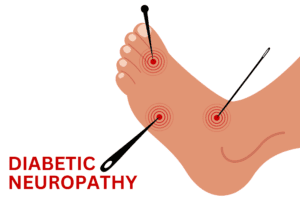Understanding Diabetic Neuropathy: A Guide from Physioheal

Diabetic neuropathy is a common complication for those living with diabetes, characterized by nerve damage primarily affecting the legs and feet. This condition can lead to a variety of symptoms, including pain, numbness, and even issues with the digestive system and cardiovascular health. While some individuals experience mild symptoms, others may face significant pain and disability. Alarmingly, diabetic neuropathy may affect up to 50% of diabetes patients, making it crucial to manage blood sugar levels and maintain a healthy lifestyle to prevent or slow its progression.
Types of Diabetic Neuropathy
There are four primary types of diabetic neuropathy, each with its own set of symptoms that may develop gradually:
1. Peripheral Neuropathy
The most common form, peripheral neuropathy primarily affects the feet and legs, and may also involve the hands and arms. Symptoms can worsen at night and include:
- Numbness or reduced ability to sense pain or temperature
- Tingling or burning sensations
- Sharp pain or cramps
- Increased sensitivity to touch
- Serious foot complications like ulcers and infections
2. Autonomic Neuropathy
This type impacts the autonomic nervous system, which controls bodily functions such as heart rate and digestion. Symptoms may include:
- Lack of awareness of low blood sugar
- Bladder or bowel dysfunction
- Gastroparesis, leading to nausea and appetite loss
- Difficulty adjusting to light changes
3. Proximal Neuropathy
Often affecting the thighs, hips, and buttocks, this type can cause:
- Severe pain in one side of the body
- Muscle weakness and atrophy
- Difficulty standing up from a seated position
4. Mononeuropathy
Focusing on a specific nerve, mononeuropathy can lead to:
- Double vision or difficulty focusing
- Facial paralysis (Bell’s palsy)
- Numbness or tingling in the hands or fingers
Risk Factors for Diabetic Neuropathy
Several factors can increase the likelihood of developing diabetic neuropathy:
- Poor Blood Sugar Control: High blood sugar levels damage nerves over time.
- Duration of Diabetes: The longer one has diabetes, the higher the risk, especially if blood sugar is poorly managed.
- Kidney Disease: Kidney damage from diabetes can lead to toxin buildup that harms nerves.
- Obesity: A body mass index (BMI) over 25 may elevate the risk.
- Smoking: Smoking restricts blood flow to the legs and feet, complicating healing.
The Role of Physical Therapy
At Physioheal, the best physiotherapy clinic in Gurgaon, we believe that physical therapy is an essential part of managing diabetic neuropathy. Our expert physiotherapists offer personalized treatment plans to alleviate symptoms and improve quality of life.
Benefits of Physical Therapy
- Pain Relief: Physical therapy can help reduce pain and discomfort associated with nerve damage.
- Muscle Strengthening: Targeted exercises can combat muscle weakness and cramps.
- Gait Training: Our therapists guide patients in relearning how to walk properly, crucial for preventing foot injuries and complications.
Specialized Treatments
- Electrical Nerve Stimulation: This technique reduces stiffness and promotes healing in foot ulcers.
- Manual Therapy and Massage: Our skilled therapists use massage techniques to alleviate muscle contractions and improve blood flow.
- Therapeutic Ultrasound: This method utilizes high-frequency sound waves to stimulate tissue healing and enhance sensitivity in the feet.
Success Stories at Physioheal
Many of our patients have experienced significant improvements in their condition through our comprehensive approach. With a combination of expert care, customized treatment plans, and continuous support, we empower our clients to manage their symptoms effectively.
Conclusion
If you or a loved one is struggling with diabetic neuropathy, don’t hesitate to reach out to Physioheal, the best physiotherapy clinic in Gurgaon. Our dedicated team of expert physiotherapists is here to provide you with the support and treatment you need to enhance your quality of life. By taking proactive steps in managing your health, you can mitigate the effects of diabetic neuropathy and embrace a healthier, more active lifestyle.
